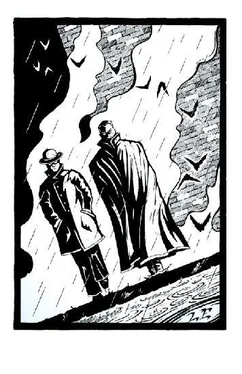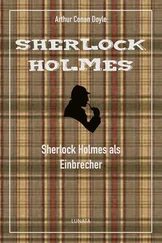Whoever had lived here, of course. Although there were few details in the summoning telegram, the force was unlikely to have called upon him for anything less than an unexplained, unexplainable, death. The solving of these things was what had made his reputation, it was where his skills lay, and it was where his interests took him. It was what made him valuable.
“Sir?” The speaker was an old man, older even than the detective, probably brought out of retirement to act as constable. The war had depleted the manpower available to the force, despite its protected status, and as the conflict went on anyone with experience, no matter how minor or how long ago it was gained, was being called back to add substance to the ever-diminishing thin blue line. It should be a matter of national thanks, thought the detective sourly, that the same calling that has removed the men who had up ‘til that point defended the virtues of law and order has also removed most of those who strove hardest to attack them. Ah well, in all things balance. Aloud, to business now, he said, “What’s happened?”
“We don’t know,” replied the constable. “It’s awful, like nothing we’ve seen, any of us. The others, they left me here to wait for you. We wouldn’t have sent for you but we can’t … we don’t…” The man tailed off, and the detective saw that there were tears in his eyes. He was extremely old and his lined face had a sagging, waxen look. Taking another breath of the fine summer air, letting the sounds of bees and birds wash around him and clothe him in their freshness, the detective said simply, “Show me.”
The inside of the cottage was as neat as the garden, although considerably more cluttered. Bookshelves, crammed with books and journals and papers, piled two or three high in places, lined the already narrow hallway. An occasional table groaned under a mass of post and newspapers. More books and papers sat on most of the stairs. Here were the first signs of disarray, the detective saw, with piles disrupted and tilted and some of the papers scattered down the steps. There was no telephone, he saw, and no pictures on what little there was of free wall space. The constable led him upwards, stepping carefully over the scattered papers.
“Was it like this when you got here?” the detective asked.
“Yes, sir,” replied the constable. “I touched as little as possible and didn’t move anything. I know that’s important in this sort of thing. When there’s been a … when someone’s died.” He stopped at the top of the stairs. “It’s in the study,” he said, gesturing to the farthest door. “I can’t go back in, don’t make me, please sir.”
“The man doesn’t have a live-in,” said the constable, swallowing audibly as the detective pushed open the door. “He has a woman, Mrs. Roundhay, who comes daily. She came this morning, but he wasn’t up like he normally is.”
“When had she last seen him?”
“Yesterday, when she left. About four, she reckons. She came back this morning at about nine and couldn’t find him. The back door was open so she came in and looked around but he didn’t answer when she called. She checked all the downstairs rooms before she went upstairs and into the study and found him. Found his body.” There was another swallow, this one liquid and loose, and the detective called, “That’s fine, Constable. Go downstairs and get yourself some water, I’ll join you there soon. Many thanks.”
The study was, if possible, more cluttered than the hallway or stairs, with all the available space seemingly taken up with books, papers, journals and ornaments. The body was on the floor in front of the desk, twisted in a heap of loose sheets and spilled tobacco, and something that had been spilled from an overturned tin and which looked like old, dried grass. A chair had been knocked back and lay against the nearest bookcase. The room smelled of vomit, although the detective could see none, and something else, something sweet, sickly and sharp. The remains hardly looked human.
Whoever the man was, he had clearly died in agony. His flesh, what the detective could see of it, was distended and yellowing; pockmarked with tiny dots of blood. The face was bloated to the point where the skin looked as though it might split. It looked somehow poisonous, the wattle of the neck ballooning over the collar in angry ridges. His hands were also swollen, the knuckles lost in the tide of grotesque, puffy flesh. His mouth was open and his tongue protruded, and even that was swollen, covered in the tiny dots, black pores against the rich and fetid purple. One eye had swelled entirely shut; the other had managed to retain an opening on the world, and in the tiny arc the detective saw, against a reddened sclera, the blackened pitch of a pupil grown vast in terror and pain and death. It was like nothing he had seen before.
After noting his initial impressions, the detective went downstairs and spoke with the constable again. “It’s a strange one, to be sure,” he said. The constable nodded; a look of gratitude on his face. Strange or not, that expression said , it’s someone else’s responsibility now; not mine any more, but yours.
“I’m sure that there’s a rational explanation though,” the detective continued. “We simply need to apply ourselves and find it. Logic will prevail.” He paused, thinking, and then said, “It may take some time, though. Can you make arrangements for the coroner to collect the body, and tell him I’ll talk to him when he has completed his investigations?”
“Yes, sir. I called him, he’s on his way.”
“Excellent. In the meantime, we have work to do here. We shall have to inspect the premises fully, and talk in more detail with the housekeeper. We shall need to build a picture of the victim, of his last days, of his life. Oh, incidentally, what do we know about him?”
“He came from London originally, sir, and retired here about ten years ago. He kept himself to himself mostly, didn’t have many visitors but received lots of post. He almost never left this place.”
“And the day of his death, the days earlier? How was he? As normal?”
“No, sir. Well, not on the day of his death, anyway. He was, well, distracted. Worried.”
“Sterling work, constable, sterling work! I see you are going to be an asset to this investigation. I presume you got this from the housekeeper?”
“Yes, sir, I’ve been chatting with her over tea while you’ve been upstairs with the … with him.”
“Good, good. So, to work! Perhaps we should start at the beginning, yes? Tell me, what was the victim’s name?”
“Holmes, sir. Sherlock Holmes.”
As Brabbins further questioned Swann, two morgue attendants arrived and took Holmes’ body away in a silent ambulance, the red cross on its gleaming white side a vivid scar against the verdant fields.
“He was either outside and came in, or the attack started in the kitchen. From there, he went along the hallway,” Brabbins said to Swann. “I’d imagine he was staggering by that point. Look, there are streaks of boot polish along the skirting where he’s kicked it, and on at least one of the shelves, the books are in disarray. More disarray,” he amended, looking at the masses of books that sat on each shelf. “See, these books here are damaged, knocked over, probably as he grasped at the shelf to keep himself upright. There are smears from his fingers here, and here, yes?”
“Yes,” said Swann, doubtfully. “How do you know that those marks weren’t there beforehand, sir?”
“Well, firstly the books themselves. There are many of them, to be sure, but they’re stacked neatly and well kept except for these few. And consider, are there other marks, Constable Swann? The shelves, the surfaces not covered in books are clean, dust-free. I’d say our Mrs. Roundhay—” gesturing towards the kitchen where the housekeeper was still crying and drinking tea, “—keeps this place gleaming, wouldn’t you? No other marks, and certainly not one so large. And look—” Brabbins put his hand onto the mark, letting Swann see how it matched the pattern of fingers slipping across the wood and into the damaged books.
Читать дальше












